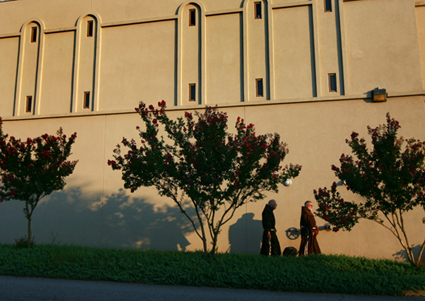
ANDERSON — Last September Father Aubrey McNeil, pastor of St. Mary of the Angels Church, said he visited a former member of the parish community who had landed in jail.
 The man, who is Hispanic, told the Franciscan priest that he was not the only person of Spanish-speaking heritage being held there.
The man, who is Hispanic, told the Franciscan priest that he was not the only person of Spanish-speaking heritage being held there.
“He said, ‘You know, there are about 20 of us in here. Would it be possible to see all of us,’” Father McNeil recalled.
A number of prisoners were being held by federal authorities at the Anderson City Jail as part of a contract with the U.S. Customs and Immigration Enforcement agency. Most Hispanics were there because of immigration charges and did not speak fluent English.
Father McNeil contacted jail officials, who already knew him because of his visits to other prisoners.
“They got back to me and thought it would be a good thing for the Spanish-speaking prisoners to have services, a Mass,” he said.
So, nearly every Monday Father McNeil and Father Thaddeus Sapio, St. Mary’s parochial vicar, pull a carry-on-sized suitcase through the jail’s front door, show their identification to a desk attendant, and proceed through a series of locked doors until they reach a small auxiliary room. There, they unpack what is needed, and allowed, for Mass.
The suitcase has white linens to cover the altar, which is two game tables pulled together, vestments, laminated cards with responses and songs for the liturgy, and a round, plastic container with the hosts.
A small plastic container of wine is also inside, but it is only for the celebrant.
Both priests are fluent in Spanish and that helps put the prisoners at ease, said Lt. Doyle Carpenter. He estimated 10 to 20 prisoners attend.
“It was actually the first religious service … to target the Hispanic population,” Carpenter said.
St. Mary has a large Hispanic community and offers two Sunday Masses in Spanish.
“I know they look forward to it because there was a week when father didn’t come … and I think they were disappointed,” Carpenter said. “I think it has been a positive thing for the Hispanic population of jail to be included in the service. I think they seem to appreciate the fact that people are coming in to provide this service.”
The Mass lasts about 40 minutes and includes a Scripture reading by one of the inmates, all of whom are dressed in red jumpsuits, white socks and beige sandals.
After Mass, the inmates chat briefly with the priests, then head toward a door, beyond which are their cells. They are mostly young, but some are middle aged. One man is not Hispanic, but likes to attend.
Response to the Monday service has been wonderful, Father McNeil said.
“Everybody who is there will come to Mass,” he said. “It means a lot to them.”
Because a large percentage of Hispanics are Catholic, it is important that a priest minister to them, Father McNeil said.
“For us Catholics, the sacraments are central things in our faith,” he said. “That we are able to celebrate the Eucharist and penance, it’s a wonderful thing to be able to do those … and can only be done with a priest coming in.”
Hispanic inmates who are jailed on non-federal offenses cannot attend the services because federal prisoners and city jail prisoners are not allowed to mix, Carpenter said. Turnover on the city-side part of the jail is much quicker, with inmates bonding out often on the same day. Federal inmates can be there for months.
As inmates have attended the services, they also have grown in their faith, Father McNeil said. But often he will go to the jail and there will be a new face there and an old one gone.
“They have really grown, from singing to saying of the prayers, they have been strong in it,” he said.
But there’s a real loss when inmates are transferred out.
“We may go Monday night and find six people have gone,” he said. “And we may have known those six for about three months.”
Father McNeil plans to continue celebrating Mass as long as they are permitted. He’d like to start a Bible study group “if I had someone willing to do it,” he said.
Printed with permission.
